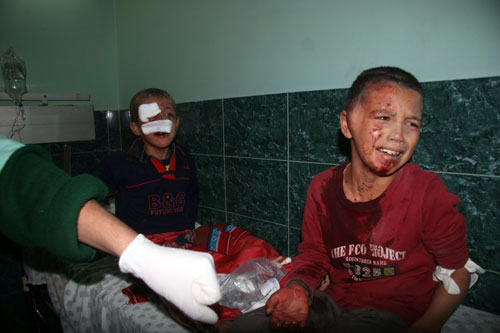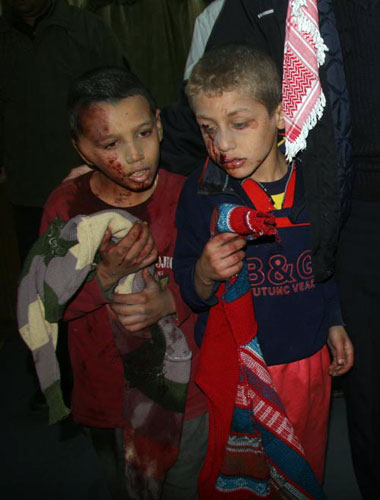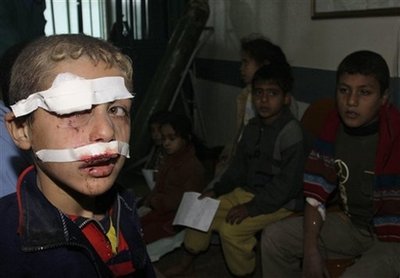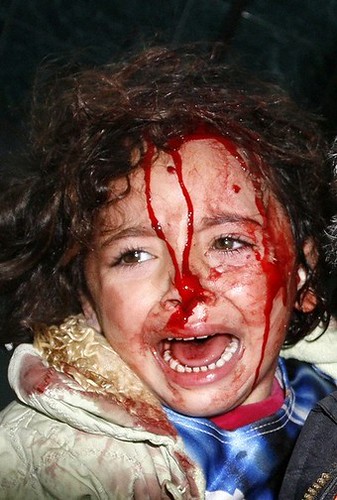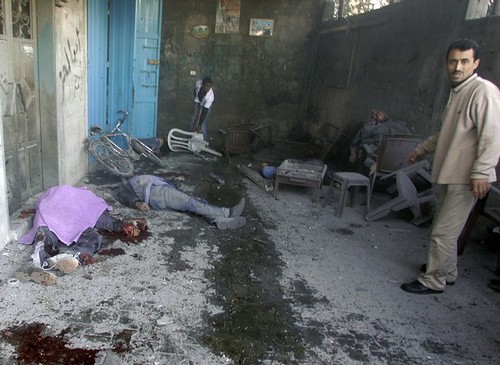More than 40 killed in Gaza school strike
January 6. 2009
GAZA // An Israeli strike has killed at least 42 people who had taken refuge inside a UN school in the Gaza Strip, the third such attack in a day, medics said.
An Israeli army artillery battery fires a smoke bomb into the Gaza Strip from the border on January 6, 2009. Israeli strikes hit two UN-run schools -- one of them crowded with refugees -- in the Gaza Strip today.
The strike hit near a school run by the UN agency for Palestinian refugees, UNRWA, in the northern town of Jabaliya, they said.
People inside the building had taken refuge from the raging conflict in the territory, witnesses and medics said. The toll quickly rose as rescuers struggled through the rubble.
Earlier in the day, two people were killed when an artillery shell slammed into a school in the southern town of Khan Yunis and three people were killed in an air strike on a school in the Shati refugee camp in Gaza City, medics said.
Israel moved forces into a southern Gaza town today and demanded Hamas be prevented from rearming as a main condition for a ceasefire in an 11-day-old conflict in which hundreds of Palestinians have been killed.
“That is the make-or-break issue,” Mark Regev, a spokesman for Israeli prime minister Ehud Olmert said about ensuring an end to weapons smuggling along the Gaza-Egypt frontier.
A senior Israeli official said the French president Nicolas Sarkozy, on a Middle East visit and in partnership with Egypt, was pursuing “a serious initiative” for a ceasefire.
“We are now working on something concrete,” the official said, disclosing talks on the size of an “international presence” along the blockaded Gaza-Egypt border, where Israel wants to stop rockets and other weapons from reaching Hamas through tunnels.
Cutting off Gaza’s smuggling tunnels from Egypt could secure an immediate ceasefire, Middle East Quartet envoy Tony Blair said today, while warning that Israel was otherwise in for a protracted campaign.
The former British prime minister said the situation in the Gaza Strip was “hell” as Israel wages Operation Cast Lead against Hamas fighters.
The Quartet, comprising the European Union, Russia, the United Nations and the United States, is struggling to mediate the peace process between Israel and the Palestinians.
“There are circumstances in which we could get an immediate ceasefire, and that’s what people want to see,” Blair told BBC radio in Jerusalem.
“Those circumstances focus very much around clear action to cut off the supply of arms and money through the tunnels that go from Egypt into Gaza.
“That is the one basis on which you can bring a quick halt to this, otherwise I think we’re into a more protracted campaign.”
And he added: “The Egyptians, in principle, are prepared to do this, they want to do it,
they recognise it’s in their own interests as well.
An Israeli tank shell killed three Israeli soldiers and wounded 24 other troops on Monday, in “friendly fire” that raised questions in the Jewish state over whether its leaders should press on with the crushing offensive.
An Israeli officer was killed in a separate incident, apparently also by Israeli fire, the army said.
Palestinian witnesses said Israeli forces pushed into Khan Younis in southern Gaza as the army widened the ground assault it launched four days ago against Hamas militants after a week of air strikes failed to stamp out cross-border rocket fire.
There was intense fighting overnight on the outskirts of the city of Gaza, where residents huddled indoors in fear. Deaths recorded by Palestinian medics reached 574.
Most of the several dozen deaths reported by hospitals in the Hamas-run Gaza Strip in recent days have been civilians.
The Israeli military said it killed 130 militants since Saturday, a figure that suggested the total Palestinian death toll since Dec 27 might be close to 700 and that bodies could still be on the battlefield.
Many of the Gaza Strip’s 1.5 million people lack food, water or power. In southern Israel, schools remained closed and hundreds of thousands of people have been rushing to shelter at the sound of alarms heralding incoming rockets.
Palestinian medics, reporting on casualties before the deaths at the UN school, said 23 Palestinian civilians were killed today, including 10 people who were hit by naval shells along the beach in the central Gaza Strip.
Two militants were also killed in fighting.
Nine Israelis, including three civilians hit in Palestinian rocket attacks, have been killed in the conflict.
At least five rockets fired from the Gaza Strip landed in Israel today, including one that hit the town of Gadera, 28km from Tel Aviv, police said. A three-year-old girl was wounded.
Ceasefire
Mr Regev said Hamas, which seized the Gaza Strip from the rival Fatah group in 2007, used the previous six-month ceasefire brokered by Cairo to double the range of its rockets from 20km to 40km.
Hamas has demanded a lifting of Israel’s blockade of Gaza in any future ceasefire.
Israel’s military, describing yesterday’s shelling of an Israeli force by an Israeli tank, said soldiers from the Golani infantry brigade were hit while occupying a building in the northern Gaza Strip.
The brigade’s commander, a colonel, was among the wounded.
The incident caused the military’s highest casualty toll since Israel launched its “Operation Cast Lead” offensive against Hamas.
“This time, we cast lead on ourselves,” said a commentator on Israeli Army Radio, who in an interview with a senior Defence Ministry official questioned whether the operation was achieving its declared goal of halting Hamas rockets, noting there has been little let-up in cross-border fire on Israeli towns.
Columnist Amos Harel, writing in Israel’s Haaretz newspaper, said the death of the three Golani brigade soldiers was “a significant first achievement” from Hamas’s perspective.
“For the first time, Israeli TV broadcasts raised the question of whether it was worthwhile for the operation to continue,” Harel wrote.
Israel launched the current offensive after Hamas called off the six-month truce last month and stepped up cross-border rocket attacks in response to Israeli raids and a blockade of the Gaza Strip.
Israel, whose leaders fight a parliamentary poll on Feb 10, made clear its priority was securing the safety of its citizens. But heavy Israeli casualties could erode strong public support for the operation.
Israel pulled its troops and more than 8,000 settlers out of Gaza in 2005 after 38 years of occupation in a move that many at the time hoped would lead to a breakthrough for relations between Israel and the Palestinians.
Palestinians lift a body near a United Nations school in Jabalya in the northern Gaza Strip January 6, 2009. Israeli tank fire killed up to 40 Palestinians at a United Nations school in the Gaza Strip on Tuesday, medical sources at two hospitals said.
A wounded Palestinian is carried near a United Nations school in Jabalya in the northern Gaza Strip January 6, 2009
A Palestinian man stands near bodies outside a United Nations school in Jabalya in the northern Gaza Strip January 6, 2009.
The body of a Palestinian woman (R) lies near a U.N. school in Jabalya in the northern Gaza Strip January 6, 2009.


